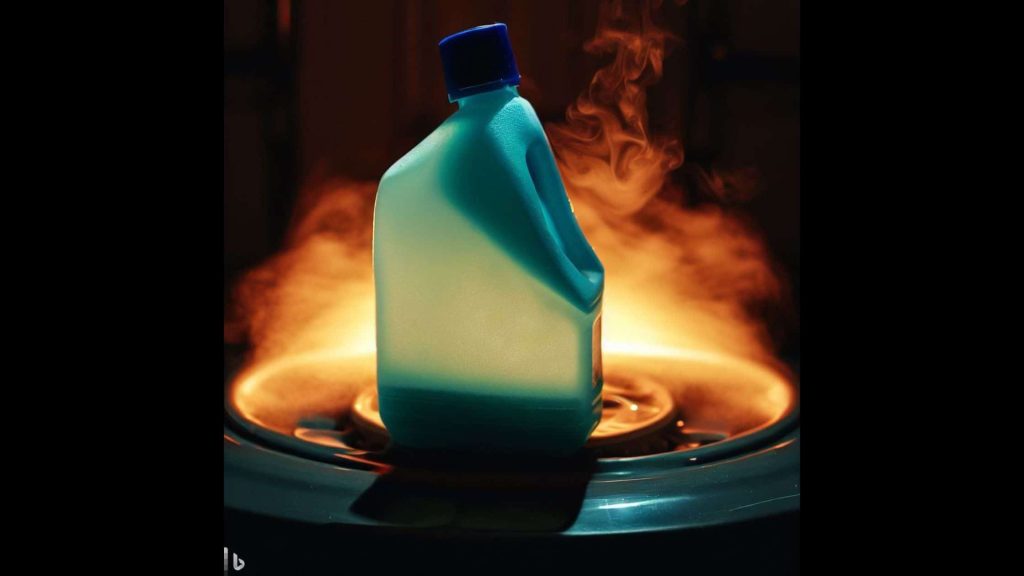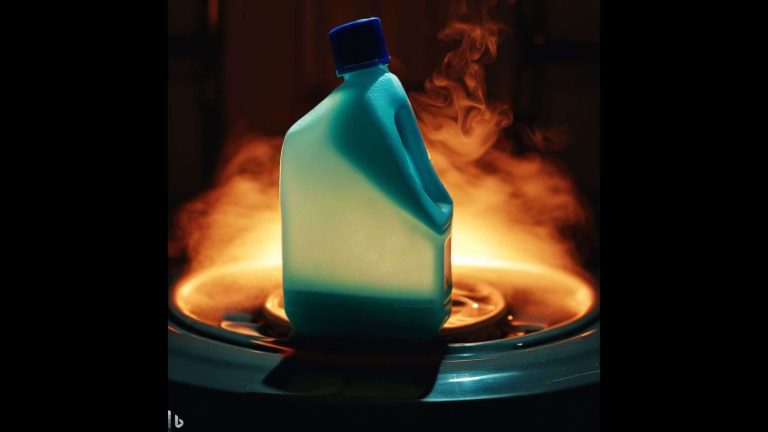Are you wondering if the storage place for your detergent is too hot that your detergent may go bad?
Laundry detergents are chemically composed and as such require special conditions to keep them as effective as they are supposed to be.
Heat can affect laundry detergents in several ways: chemical reactions may occur, leading to a reduction in their cleaning ability, or the detergent may become clumpy, making it difficult to use. If you store your detergent in a hot environment for an extended period, you could find that it’s not as effective as it should be.
In this article, we’ll explore the ways in which heat affects laundry detergents and provide you with some simple tips for better storage and usage.
Table of Contents

How heat affects laundry detergents
When you store laundry detergent in an area exposed to high temperatures, it can affect its components, causing chemical reactions and potentially altering the detergent’s effectiveness.
The chemicals in laundry detergents can react differently to heat, which might impact their ability to dissolve in water and clean your clothes effectively.
Heat can cause laundry detergents to lose some of their potency over time.
As a result, your detergent might not work as well in cleaning your clothes and removing stains.
High temperatures can also cause physical changes to the detergent’s texture or consistency, depending on the type of detergent you are using.
For instance, liquid detergents might become thicker, and powder detergents can clump together when exposed to excessive heat.
It’s always a good idea to store your detergents in a cool and dry place, away from direct sunlight or extreme heat sources.
This way, you can prolong the detergent’s shelf life and maintain its performance for an extended period.
Laundry detergent components
Laundry detergents are made of various components that work together to clean and remove stains from your clothes.
Some of the main ingredients include surfactants, enzymes, chlorine bleach, and fabric softeners.
Each of these components plays a critical role in ensuring the effectiveness of the detergent and may be directly affected by extreme heat.
Below is how heat affects some of the components of laundry detergents.
1. Enzymes
They are proteins that help break down and remove specific types of stains, such as proteins, carbohydrates, and fats. They are particularly effective at removing stubborn stains, like blood, sweat, or grass. The optimal temperature for the enzymes in detergents is between 104-130ºF (40-55ºC)
2. Chlorine bleach
This is an optional ingredient in some laundry detergents, especially in those formulated for white fabrics. Heat causes more rapid decomposition of the active ingredient in chlorine bleach, sodium hypochlorite(NaOCl), usually in 5 or 5.25% concentration. This makes the detergent less potent as the hypochlorite concentration decreases. This process takes some time, and if you use the detergent before its expiration date, it may still be effective even if kept in a hot laundry room.
Signs of laundry detergent deterioration
Heat can indeed cause laundry detergent to deteriorate over time.
Here, we will discuss some of the signs that indicate your detergent has gone bad in high temperatures.
- If your detergent has turned hard or cakey, this could be a sign that it has deteriorated. Detergents may form clumps or lumps due to the heat, making them difficult to dissolve in water.
- Presence of stains on your clothes after washing. If your detergent has gone bad, it may not remove stains effectively and could even cause new stains.
- You may observe a significant change in the consistency and color of your detergent
- Your detergent may lose its potency as it becomes less effective in cleaning your laundry.
Shelf Life and Expiration Dates
Opened Detergent
When it comes to the shelf life of opened laundry detergent, it’s essential to pay close attention to the expiration date.
Generally, liquid laundry detergent lasts around six months to a year once it’s opened.
But this can vary depending on the specific product, so it’s best to look for the expiration date on the packaging source.
Unopened detergent
The shelf life of unopened laundry detergent is longer than opened products.
Unopened liquid laundry detergent can remain effective for nine months to one year after the purchase date, depending on the product source.
Remember to always check the packaging for a specific expiry date or best-before date to ensure you’re using the product at its best.
Most laundry detergents are safe to use after expiration, but their effectiveness may decline over time. It’s always best to use detergent within the recommended timeframe for the best results.
Tips to store laundry detergent
Proper storage of your laundry detergent is essential for maintaining its effectiveness.
Here are some tips to properly store your laundry detergents:
- Always store your detergent in a cool, dry place, away from direct sunlight and extreme temperatures.
- Dividing your detergent between small, airtight containers is a smart way to keep it fresh and protected from moisture and contamination. When using powder detergents, an airtight container is especially crucial, as any exposure to humidity could cause the product to clump together.
- Check the labels of your detergents for specific storage recommendations.
Does Laundry Detergent Go Bad In Heat? FAQs
It is not recommended to leave Tide Pods in a hot car. Excessive heat can impact the integrity of the detergent pods, potentially causing them to break down or leak. It is ideal to store your detergent in a cool, dry place to ensure its effectiveness and longevity.
Detergents are designed to be effective across a range of temperatures. They work well in cold water, usually around 20°C or lower, which saves energy and preserves colors. Warm water, around 30°C to 40°C, enhances their cleaning power for greasy stains, while hot water, ranging from 50°C to 60°C, is reserved for heavy-duty cleaning and tough stains. It’s essential to follow the instructions on the detergent’s packaging
Detergent gets hot when dissolved in water due to the enthalpy change of solution, a phenomenon where certain substances release heat during the dissolving process. When they are added to water, they form well-defined chemical bonds with water molecules, which can lead to an exothermic reaction, releasing heat.
While heat is not a direct factor in the reaction of detergent pods, using warm or hot water during washing can enhance their cleaning performance by improving the detergent’s effectiveness in breaking down stains.
References:
Related articles:

